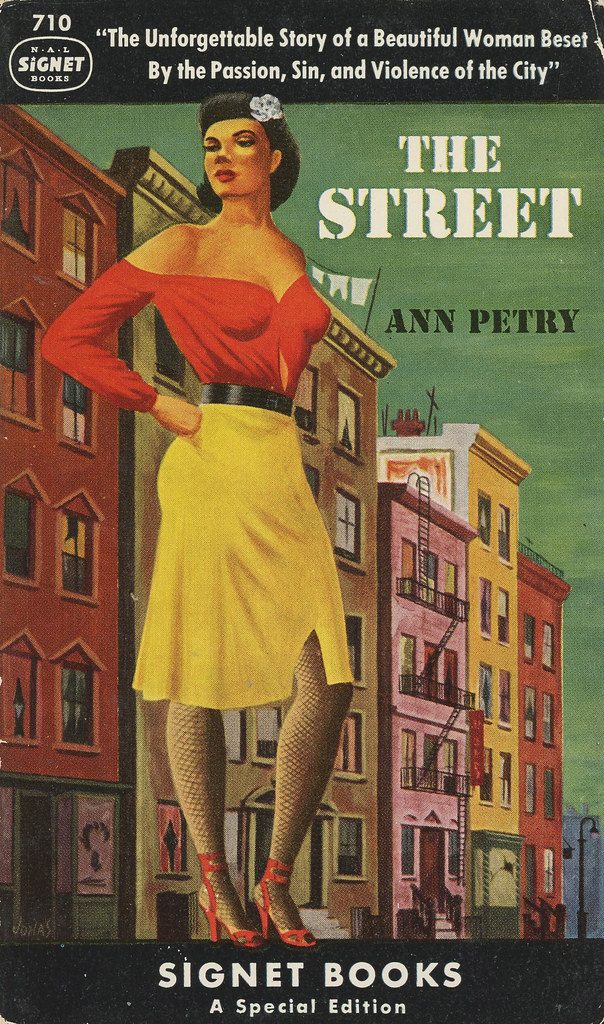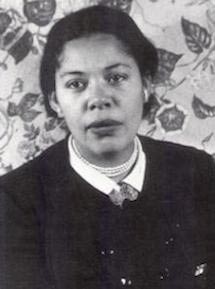Quotes from The Street by Ann Petry (1946)
By Emma Ward | On October 31, 2017 | Updated February 15, 2025 | Comments (0)

Ann Petry’s 1946 novel, The Street, presents the story of a single mother struggling to raise her young son and avoid the dangerous influences surrounding their Harlem apartment. The following quotes from The Street illustrate the raw energy and engrossing storytelling of the novel that make it feel fresh and engaging for the contemporary reader.
The Street was the first novel by an African-American woman author to sell over a million copies, and in total, sold more than a million and a half.
The story centers on Lutie Johnson, who copes with racism, sexual harassment, violence, and class divisions in World War II-era New York City. Lutie loves the wisdom of founding father Benjamin Franklin, and believes that if she follows his principles of thrift and hard work, that she can aspire to the American dream.
The story is told through multiple points of view, though mainly taking Lutie’s perspective. She settles for a shabby walk-up apartment in Harlem, since it’s the best she can afford. She aspires above all to be able to move herself and son Bub away from their 116th Street tenement and the cast of characters that she finds aversive, especially the men who feel entitled to her body.
. . . . . . . . . .
“Her voice had a thin thread of sadness running through it that made the song important, that made it tell a story that wasn’t in the words – a story of despair, of loneliness, of frustration. It was a story that all of them knew by heart and had always known because they had learned it soon after they were born and would go on adding to it until the day they died.”
. . . . . . . . . .

Learn more about Ann Petry
. . . . . . . . . .
“She didn’t have to turn around, anyway; he was staring at her back, her legs, her thighs. She could feel his eyes traveling over her — estimating her, summer her up, wondering about her. As she climbed the last flight of stairs, she was aware that the skin on her back was crawling with fear. Fear of what? she asked herself. Fear of him … of the smells in the halls, the high steep stairs, of yourself?”
. . . . . . . . . .
“Having solved one problem, there was always a new one cropping up to take its place.”
. . . . . . . . . .

You might also like: The Narrows by Ann Petry
. . . . . . . . . .
“Anybody could be rich if he wanted to and worked hard enough and figured it out carefully enough.”
. . . . . . . . . .
“And while you were out working to pay the rent on this stinking, rotten place, why, the street outside played nursemaid to your kid. The street did more than that. It became both mother and father and trained your kid for you, and it was an evil father and a vicious mother, and, of course, you helped the street along by talking to him about money.”
. . . . . . . . . .

. . . . . . . . . .
“… And she got the feeling that Boots Smith’s relationship to this swiftly moving car was no ordinary one. He wasn’t just a black man driving a care at a pell-mell pace. He had lost all sense of time and space as the car plunged forward into the cold, white night.”
. . . . . . . . . .
“It’s best that the man do the work when the babies are young. And when the man is young. Not good for the woman to work when she’s young. Not good for the man.”
. . . . . . . . . .
“The stillness. It was crouched down in the next booth. It was waiting for her to leave. It would walk down the street with her and into the apartment. Or it might leave the shop when she did, but not go down the street at all, but somehow seep into the apartment before she got there, so that when she opened the door it would be there. Formless. Shapeless. Waiting. Waiting.”
. . . . . . . . . .
“I’m young and strong, there isn’t anything I can’t do.”
. . . . . . . . . .
“Streets like the one she lived on were no accident. They were the North’s lynch mobs, she thought bitterly; the method the big cities used to keep Negroes in their place. And she began thinking of Pop unable to get a job; of Jim slowly disintegrating because he, too, couldn’t get a job, and of the subsequent wreck of their marriage; of Bub left to his own devices after school.”
. . . . . . . . . .
From the time she was born, she had been hemmed into an ever-narrowing space, until now she was very nearly walled in and the wall had been built up brick by brick by eager white hands.”
. . . . . . . . . .
“And then she thought about the other streets. It wasn’t just this street that she was afraid of or that was bad. It was any street where people were packed together like sardines in a can.”
. . . . . . . . . .
“When people are alone, they are always afraid of the dark, she thought. They keep trying to look into the future. There was no way of knowing what threat lurked just beyond tomorrow or the next day, and the not knowing is what makes everyone afraid.”
. . . . . . . . . .

6 Interesting Facts About Ann Petry
. . . . . . . . . .
“These other folks feel the same way, she thought—that once they are freed from the contempt in the eyes of the downtown world, they instantly become individuals. Up here they are no longer creatures labeled simply ‘colored’ and therefore all alike.”
“She noticed that once the crowd walked the length of the platform and started up the stairs toward the street, it expanded in size. The same people who had made themselves small on the train, even on the platform, suddenly grew so large they could hardly get up the stairs to the street together. She reached the street at the very end of the crowd and stood watching them as they scattered in all directions, laughing and talking to each other.”
. . . . . . . . . .
“The act of driving the car made him feel he was a powerful being who could conquer the world. Up over hills, fast down on the other side. It was like playing god and commanding everything within hearing to awaken and listen to him.”
Leave a Reply